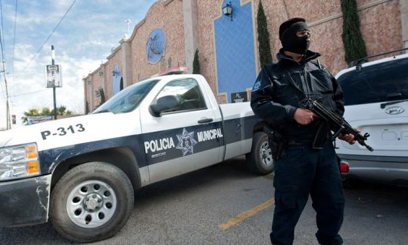In the past five years “the power of drug traffickers has reduced a large part of the nation’s journalism to silence,” said Raul Omar Martinez, president of the Buendia Foundation on journalism.
Last week, the dismembered bodies of three photographers and a news company employee were found, wrapped in plastic bags, in a canal in the metropolitan area of Veracruz, a port city on the Gulf of Mexico.
Several days earlier the Veracruz state correspondent of the national weekly news magazine Proceso was found strangled in her home.
Relatives of the photographers say they were killed after being summoned to a meeting. One of them, Gabriel Huge, gave his camera to his sister Mercedes before leaving.
“I now think that he knew what was going to happen,” the woman said on the day of her brother’s funeral. No one knows for certain why they went to the meeting.
Journalists in Veracruz started being summoned by suspected drug gangs after the killing of local reporter Yolanda Ordaz de la Cruz in July 2011, according to a local journalist who declined to be named.
Sometimes they are called in when gangs wish to give them messages about what they may or may not publish, according to another journalist who refused to give his name for fear of reprisals.
Other times, armed men summon journalists and beat several of them in front of their colleagues for refusing to obey their orders.
Journalists often go along because their families are otherwise threatened with reprisals.
The state of Veracruz has become a battleground between the powerful Sinaloa drug gang of Mexico’s most wanted man, Joaquin “El Chapo” Guzman, and the brutal Zetas, a group founded by elite commandos who deserted in the 1990s.
The Zetas controlled the crime world in the port of Veracruz between 2008 and 2011 and harassed the news media. But in mid 2011 a new group arrived linked to the Sinaloa Cartel known as the New Generation or MataZetas — the Zeta Killers.
Another Veracruz reporter who spoke on condition of anonymity explained the difficulty.
“A police commander that was your source a few months later becomes a Zeta, and calls you up with information,” the reporter said.
“I asked myself, ‘what if one day the coin flips and another organization wants to pressure you?’”
“And that’s what happened” when the MataZetas arrived, said the reporter.
Veracruz state is now one of the 10 most dangerous places in the world to work as a journalist, according to Paris-based media watchdog Reporters Without Borders (RSF). Since the start of 2011, eight media workers have been killed there.
The situation in Veracruz is a “combination of negligence and generalized corruption among the security forces, particularly at state level,” according to New York-based media watchdog the Committee to Protect Journalists (CPJ).
The Zetas have already imposed their rules on journalists in the northeastern state of Tamaulipas, north of Veracruz on the Gulf of Mexico.
And a similar situation occurred with different gangs in Ciudad Juarez, a city on the US border with Mexico’s highest murder rate.
In September 2010, after the killing of a photographer, the El Diario de Juarez newspaper published an editorial directly addressing drug gangs.
“What do you want from us?” it said. “What do you want us to publish or not publish, so we know what to adhere to?”
Days later President Felipe Calderon announced a plan to protect journalists, and last week Mexico’s Congress approved a law protecting journalists on risky assignments.
The threats and killings however show no sign of abating.
Some 79 journalists have been killed and 14 have gone missing since 2000, according to the National Commission of Human Rights, an autonomous state body.











































